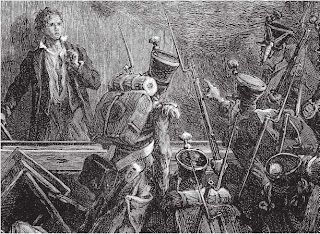Currently reading: Les Miserables by Victor Hugo
I try to read one ‘big book’ each year – a major classic of the 19th century, usually aimed in some way at my current writing. These big undertakings are interspersed with lighter reading material to provide variety, but up until now the big projects have always eclipsed every other book I read throughout the year; sometimes their impact has been profound (eg. David Copperfield, which I read in 2010).
This year’s marathon novel is Les Miserables by Victor Hugo. I’m reading it partly because I enjoyed the film, partly because I need to better understand early to mid 19th century France.
I’m currently halfway through. Here are my impressions:
- I soon discovered that the film, which I had thought complex, is the most superficial rendering of the story imaginable. The book is simply epic in scale, and I don’t use that word lightly – it is panoramic and deeply profound, with a huge cast of characters (which I’ll come to shortly), a plot that spans many years, and themes that cover almost every aspect of the human condition. It’s like a less impenetrable version of War and Peace.
- The characterisation is generally masterful. Jean Valjean and the Thenardiers are particularly compelling, but for different reasons. However, some of the characters, even quite major ones, are less well constructed and Cosette is only believable as an abused child (she becomes vacuous and one dimensional when she grows up). I wish Javert was more rounded because the relationship between him and Jean Valjean is fascinating.
- At its best, the storytelling and the language is sublime. The narrative (and some of the characters) tend towards soliloquy, but it usually works.
- However, the bad bits of the book are incredibly boring. The battle of Waterloo, of only passing direct significance to the story, is told in a huge section six chapters long; it is useful only because to understand France in the 19th century it’s essential to understand Waterloo. There is also an incredibly long and minute description of a convent, again of extremely minor significance to the story as a whole, which could be infinitely improved by cutting these sections altogether.
- The author’s own voice frequently intrudes into the story, usually to provide thinly veiled political opinions. However, such is the power of Hugo’s writing that even these bits are usually compelling!
One quote that particularly stood out to me:
“… and the kings resumed their thrones, and the master of Europe was put in a cage, and the old regime became the new regime, and all the shadows and all the light of the earth changed place, because, on the afternoon of a certain summer’s day, a shepherd said to a Prussian in the forest, ‘Go this way, and not that!'”
This novel is proving to be quite an adventure, and although it’s not all an easy ride I’m sure I will enjoy it through to the end!
Alex Roddie Newsletter
Subscribe here to receive my occasional personal newsletter in your inbox. (For the fun stuff, please consider subscribing to Alpenglow Journal instead!)




